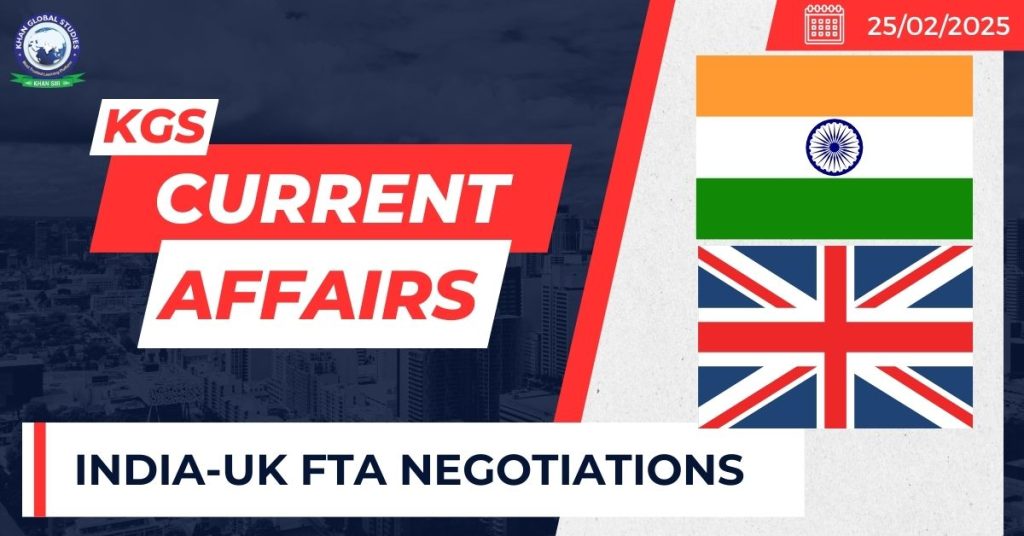Context:
The 15th round of negotiations on Free Trade Agreement (FTA) between India and UK has recently started.
More on the News
India-UK FTA negotiations started in January 2022.
It deals with 26 chapters covering goods, services, investments, and intellectual property rights (IPRs).
The FTA will be the most comprehensive trade deal India had signed with any developed country.

Besides FTA, negotiations on a Bilateral Investment Treaty (BIT) and a Double Contribution Convention Agreement (DCCA) are ongoing.
- BIT: Reciprocal agreements between two countries to promote and protect foreign private investments in each other’s territories.
- DCCA: A social security agreement where social security contribution of short-term cross-border workers are exempted or reimbursed.

Present Trade Relations
- UK is the 16th-biggest trading partner of India.
- Bilateral trade stood at $21.34 billion in FY24.
- A target to double bilateral trade by 2030 had been set.
- The trade relationship is valued at £41 billion and supports over 6 lakh jobs across both nations.
Significance of an India-UK FTA

- Shape other FTAs: It will become template for India’s trade pacts with the European Union (EU) and other countries.
- Increased Exports: India’s exports like pharmaceuticals, electronics, and textiles will see a boost, leading to greater investment activity and job creation.
- Services Trade: India’s services exports in sectors like telecommunications and business will benefit from a liberalised and competitive services regime.
- Geoeconomic shifts: UK’s Brexit, India’s opting out of the Regional Comprehensive Economic Partnership (RCEP), and the uncertainty caused by recent US trade policies has led both to explore newer markets, for which FTAs are critical.
Potential Roadblocks
- Carbon Tax: India is seeking exemptions from UK’s Carbon Border Adjustment Mechanism (CBAM) which can dilute the FTA.
- Labour Mobility: Migration, mobility, and a liberalised visa regime for Indian workers remains an issue for UK.
- Rules of Origin (RoO): India wants robust RoO to prevent third countries taking advantage of the preferential tariffs by re-routing goods via UK to India.
- Impact on Domestic Industry: UK wants lower tariffs on its exports like whisky and car (currently 100-150%) and greater access to Indian markets for its financial and legal services, but these can adversely impact domestic players in India.
Way forward
- Non-Tariff Barriers (NTBs): India should push for elimination of NTBs (strict standards and certification requirements) that have constrained its exports like agricultural products.
- Tariff Rate Quotas (TRQs): A TRQ on UK’s exports like cars will place a ceiling on the quantity of imports allowed at concessional tariff rates, allaying domestic concerns.
- Strengthen Economic Partnership: Alongside FTA talks, both countries should follow the Roadmap 2030 to deepen trade and investment cooperation.

